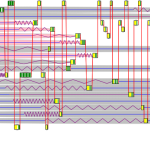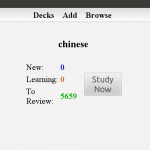Articles tagged with ‘SRS’
-
Why flashcards are terrible for learning Chinese
Flashcards are often viewed as a silver bullet, promising swift mastery of characters, words and more, but relying on flashcards too much has serious drawbacks, and if you’re not careful, they can hinder more than they help.
Read → -
Student Q&A, December 2023: How many words to learn, if it’s good to learn radicals, and whether to learn simplified or traditional characters
How many words is reasonable to learn in a day? Will focusing on radicals make learning characters easier? And should you learn simplified or traditional characters, or maybe both?
Read → -
Spaced repetition is not limited to flashcards
Spaced repetition is important for learning anything, but especially vocabulary in a foreign language like Chinese. However, there’s much more to spaced repetition than vocabulary flashcard apps! Even if you dislike such apps, make sure you incorporate spaced repetition in some other way.
Read → -
Sensible Chinese character learning challenge 2014
The 2014 sensible Chinese character learning challenge starts soon! This article introduces the challenge and how you join us. Apart from learning a lot of characters and improving the way you learn characters, you also get a discount and free extensions on Skritter, as well as a chance of winning character posters from Hanzi WallChart!
Read → -
Sensible Chinese character learning revisited
In a way, learning Chinese characters is very much like learning vocabulary in any foreign language and much of the efficient methods developed there works well for Chinese as well. However, characters are also fundamentally different from words in English and this influences how we should learn them as well. This article is a recap of how to learn Chinese characters in a sensible way. It is also a prologue for the upcoming character learning challenge.
Read → -
Flashcard overflow: About card models and review directions
The question of how to design flashcards is faced by all learners who use them. What should you put on the front? What should you put on the back? Should you add single characters or whole words? Or perhaps sentences are better? The general answer is that it depends and this article discusses some of the factors the answers depend on.
Read → -
The get-back-up-to-speed summer challenge
This is a challenge to encourage readers (and myself) to get more out of the remaining weeks of the summer. I have huge Anki and skritter queues and I plan to fight the down to zero before September 1st. You might need to study more vocabulary or you might have other things you want to complete this summer. Will you join the challenge?
Read → -
If you think spaced repetition software is a panacea you are wrong
Spaced repetition software (SRS) is widely discussed online, and generally speaking, there is a spectrum between people who think SRS is the holy grail of learning anything and those that think SRS is artificial, passive and just a waste of time. This article argues that this polarisation is a serious mistake, SRS is a tool and like any other tool, how we use it determines what we get from it.
Read → -
You can’t learn Chinese characters by rote
My conclusion after years of learning characters is that rote learning is useless. Spaced repetition software is good, but it’s still not enough. If adult foreigners are going to learn to write Chinese by hand, we really need another method. We need mnemonics, we need active processing, we need to quit rote learning and stop using SRS mechanically.
Read → -
Measuring your language learning is a double-edged sword
Spaced repetition software offers a great way of measuring progress, every step forward is recorded and clearly visible. However, this is also a trap, because even though SRS is useful, it’s just a tool, not a comprehensive strategy. Measurable progress is a great help, but only if you use it correctly.
Read →






